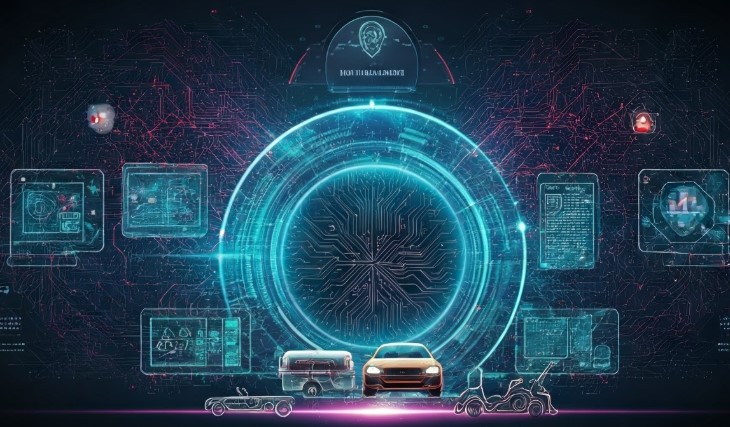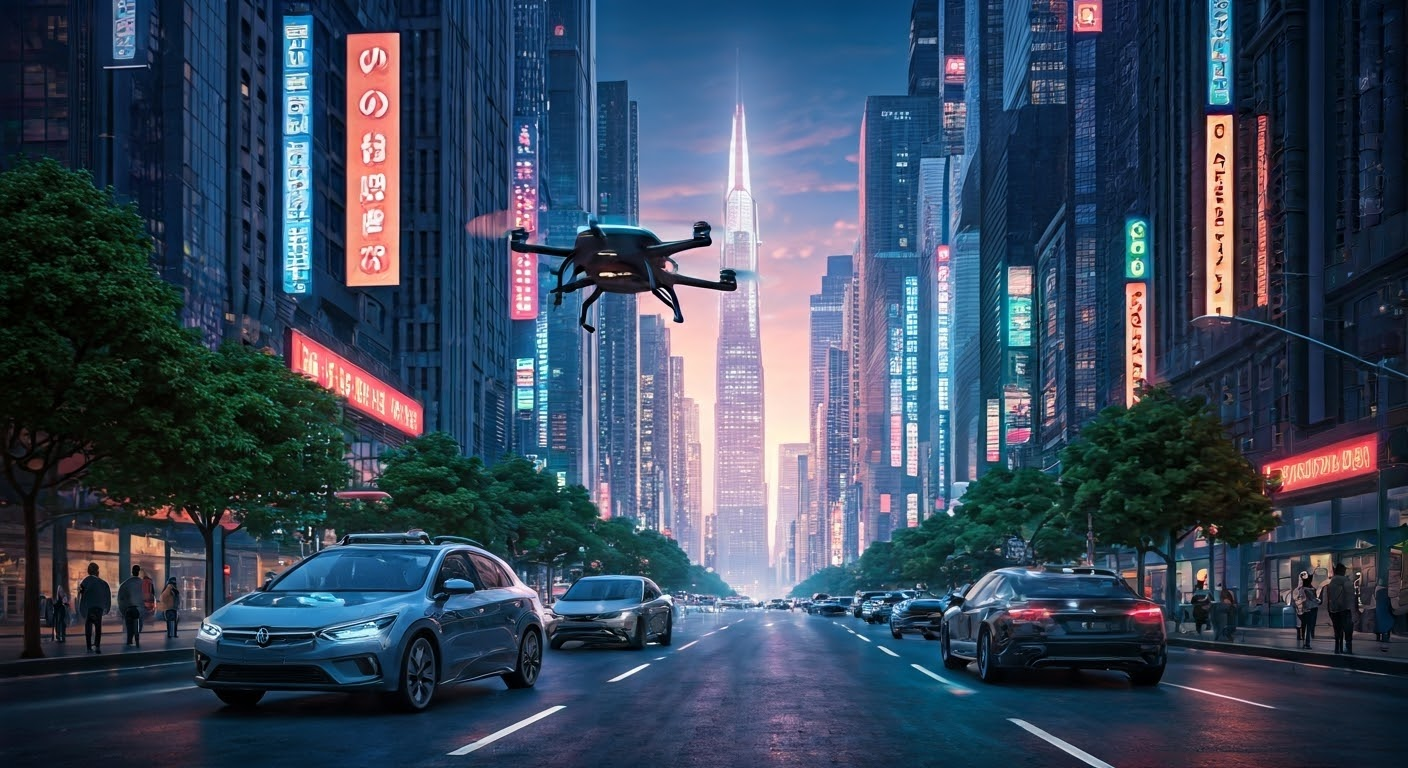
Anticipating AI Trends 2025: A Bright Forecast
Key Highlights
- Advancements in NLP will lead to more sophisticated AI assistants and chatbots.
- The healthcare industry will see breakthroughs in AI-driven solutions, including personalized medicine and AI-powered diagnostics.
- AI's role in cybersecurity will increase, with AI agents playing a vital role in incident response and threat detection.
- Autonomous vehicles and drones will become more prevalent, transforming transportation and logistics.
- AI-powered personal assistants will become increasingly human-like, offering more seamless and intuitive interactions.
Introduction
The digital transformation fueled by artificial intelligence (AI) is rapidly changing the world around us, revolutionizing industries and creating new business models. As we stand on the cusp of 2025, the excitement surrounding AI is palpable. The coming year promises to usher in a wave of innovative AI applications with the potential to reshape our interactions with technology and the world around us.
Top AI Trends to Watch in 2025

From enhancing natural language processing to revolutionizing healthcare and bolstering cybersecurity, AI is poised to impact various sectors significantly. These advancements go beyond incremental improvements; they represent a fundamental shift in how we live, work, and interact with technology.
Join us as we explore the most exciting AI trends expected to dominate in 2025, unveiling the transformative potential they hold for businesses and individuals alike.
1. Advancements in Natural Language Processing (NLP)
Advancements in natural language processing (NLP) are set to revolutionize how businesses operate in 2025. With the rise of generative AI and AI agents, artificial intelligence is becoming more interactive and agentic. Business leaders are leveraging NLP to drive digital transformation, enhancing customer service and creating new business models. The focus on data quality is paramount, as NLP applications continue to provide real value. As we look ahead to next year, NLP will further streamline routine tasks and tackle new challenges in incident response and automation.
2. Breakthroughs in AI-Driven Healthcare Solutions
The healthcare industry is on the verge of a revolution powered by AI. By 2025, we can expect to see groundbreaking AI-driven solutions that will transform patient care, enhance diagnostics, and accelerate drug discovery.
AI will play a crucial role in analyzing vast datasets from clinical trials, identifying potential drug candidates, predicting disease outbreaks, and personalizing treatment plans. AI-powered diagnostic tools will become more accurate and efficient, enabling earlier diagnoses and improved treatment outcomes.
These advancements will enhance patient outcomes and significantly reduce healthcare costs, leading to a considerable ROI for healthcare providers investing in these cutting-edge technologies.
3. Expansion of AI in Cybersecurity Measures
As cyber threats grow more sophisticated, so must our defenses. AI is emerging as a critical tool in the fight against cybercrime, with 2025 expected to witness a significant expansion of AI in cybersecurity measures.
AI-powered systems are better equipped to detect and respond to threats in real-time. They can analyze network traffic patterns, identify anomalies, and take immediate action to contain breaches, playing a crucial role in incident response. In addition to these advantages, AI will play a vital role in the following areas:
- Predicting and Preventing Attacks: AI algorithms can analyze vast amounts of data to predict and prevent attacks before they occur.
- Detecting Malware: AI can be trained to identify and neutralize even the most sophisticated malware, including zero-day attacks.
- Improving Security Posture: AI can help organizations identify vulnerabilities in their systems and applications and recommend appropriate security measures.
These applications will make AI an indispensable asset in maintaining a robust security posture in an increasingly interconnected world.
4. The Rise of Autonomous Vehicles and Drones
Autonomous vehicles and drones are no longer a futuristic concept; they are rapidly becoming a reality. By 2025, we can anticipate a substantial rise in these self-driving technologies, presenting new ways to transport goods and people.
Self-driving cars will transform transportation, making it safer, more efficient, and more accessible. We can expect to see a surge in autonomous ride-sharing services, delivery robots, and driverless trucks. Simultaneously, drones will be increasingly utilized for various purposes, from package delivery and aerial surveillance to infrastructure inspection and emergency response.
The widespread adoption of autonomous vehicles and drones promises to revolutionize logistics, reduce transportation costs, and create new economic opportunities.
5. AI-Powered Personal Assistants Becoming More Human-Like
AI-powered personal assistants like ChatGPT have already made significant strides in recent years. As we move toward 2025, we can expect these AI agents to become even more sophisticated, capable of understanding and responding to our needs in a more human-like way.
Voice assistants will become more adept at understanding natural language, interpreting our emotions, and even predicting our needs. They will seamlessly integrate into our daily lives, helping us manage our schedules, control smart home devices, and access information with unparalleled ease. Businesses can leverage these advancements in customer service, creating AI agents that provide personalized support, answer complex questions, and enhance customer satisfaction.
The future of AI-powered personal assistants is bright, promising a more intuitive and personalized technological interaction.
6. Enhanced AI Algorithms for Climate Change Predictions
Climate change is one of the most pressing challenges of our time, and AI is emerging as a vital tool in combating this global crisis. AI algorithms are becoming more powerful and capable of analyzing vast amounts of climate data to make more accurate predictions about future climate patterns.
By 2025, we can expect significant advancements in this area. AI will be crucial in predicting extreme weather events, analyzing the impact of climate change on different regions, and identifying optimal strategies for climate change mitigation and adaptation. Data quality remains paramount for accurate predictions, and scientists are constantly working to improve data collection methods and refine AI models.
Advanced AI-powered climate models will be essential for governments and organizations to make informed decisions, develop effective policies, and mitigate the effects of climate change on a global scale.
7. Major Innovations in AI-Based Educational Tools
The education sector is undergoing a significant transformation, with AI playing an increasingly important role. AI-based educational tools are emerging as powerful allies for educators, providing personalized learning experiences, automating administrative tasks, and offering valuable insights into student progress.
Agentic AI, with its ability to provide personalized feedback and tailor educational content to individual student needs, will be a game-changer in education. By 2025, we can anticipate even more innovative AI applications in this space. Imagine AI-powered tutoring platforms that provide personalized support, intelligent assessment tools that offer real-time feedback, and adaptive learning platforms that adjust to each student's pace and learning style.
Feature
Benefits
Personalized learning paths
Catered to individual student needs and learning styles
AI-powered tutoring systems
Provide on-demand support and personalized feedback
Intelligent assessment tools
Offer real-time feedback and identify areas for improvement
These advancements hold immense business value for educational institutions and EdTech companies, opening up new avenues for revenue generation and enhancing the learning experience for students worldwide.
8. AI's Role in Enhancing Virtual Reality Experiences
The convergence of AI and Virtual Reality (VR) is set to create incredibly immersive and engaging experiences. AI will play a crucial role in enhancing the realism, interactivity, and personalization of VR applications. We can anticipate the emergence of new business models as AI and VR technologies continue to intertwine.
In the entertainment industry, AI-powered VR experiences will transport users to realistic virtual worlds, enhancing gaming, storytelling, and interactive entertainment. Beyond entertainment, AI-driven VR will revolutionize various sectors, including:
- Training & Simulation: Creating realistic and safe environments for training in fields like healthcare, aviation, and military.
- Design and Engineering: Enabling professionals to visualize and interact with their designs in a 3D virtual space.
- Therapy and Rehabilitation: Providing immersive experiences for treating phobias, PTSD, and other mental health conditions.
9. The Evolution of AI in the Financial Sector
The financial services industry has always been at the forefront of technological adoption, and AI is no exception. Financial institutions are increasingly leveraging AI to automate tasks, improve decision-making, and enhance customer experiences.
By 2025, we can expect to see even more innovative applications of AI in finance. AI-powered robo-advisors will provide personalized investment advice, fraud detection systems will become more sophisticated, and algorithmic trading will reach new levels of speed and efficiency. Banks and financial institutions are poised to reap significant ROI, reducing costs, managing risks more effectively, and offering tailored financial services.
As AI continues to evolve, it will reshape the financial landscape, creating a more efficient, customer-centric, and secure financial ecosystem.
10. AI's Impact on the Future of Work and Employment
While AI promises increased efficiency and innovation, its impact on the future of work is a topic of much discussion. One thing is certain: AI will fundamentally change how we work and what skills are needed in the job market. Automation will likely displace certain job roles, particularly those involving repetitive tasks.
However, it's important to remember that AI will also create new job opportunities that require different skill sets. As AI becomes more integrated into various industries, the demand for professionals with expertise in AI development, data science, and machine learning will continue to rise. Preparing for the future of work requires individuals and organizations to adapt and embrace lifelong learning.
Governments and educational institutions must collaborate to equip the workforce with the skills needed to thrive in an AI-powered world.
KeywordSearch: SuperCharge Your Ad Audiences with AI
KeywordSearch has an AI Audience builder that helps you create the best ad audiences for YouTube & Google ads in seconds. In a just a few clicks, our AI algorithm analyzes your business, audience data, uncovers hidden patterns, and identifies the most relevant and high-performing audiences for your Google & YouTube Ad campaigns.
You can also use KeywordSearch to Discover the Best Keywords to rank your YouTube Videos, Websites with SEO & Even Discover Keywords for Google & YouTube Ads.
If you’re looking to SuperCharge Your Ad Audiences with AI - Sign up for KeywordSearch.com for a 5 Day Free Trial Today!
Conclusion
Exciting AI trends are set to revolutionize various industries by 2025. From advancements in NLP to AI-driven healthcare solutions and the rise of autonomous vehicles, the future is bright with endless possibilities. With AI's expanding role in cybersecurity, climate change predictions, and educational tools, we're on the brink of a technological renaissance. As AI evolves in finance, work, and entertainment, society will experience a profound transformation. Embrace the future of AI today to stay ahead of the curve and unlock a world of innovation and efficiency.
CTA: Stay informed about the latest AI trends and developments – subscribe to our newsletter for exclusive insights and updates.
Frequently Asked Questions
What Industries Will Be Most Affected by AI in 2025?
AI will profoundly impact healthcare, financial services, cybersecurity, education, and the entertainment industry.
How Will AI Change Daily Life by 2025?
AI agents will become more integrated into our daily lives, automating routine tasks, enhancing customer experiences, and making technology more intuitive.
Can AI Help in Solving Climate Change?
AI's data analysis and predictive capabilities are invaluable for understanding climate change patterns, making predictions, and informing governance and mitigation strategies.
What Are the Ethical Considerations of AI Development?
Ethical considerations in AI development include data privacy, algorithmic bias, job displacement, and AI's role in decision-making, emphasizing the need for responsible AI governance.
